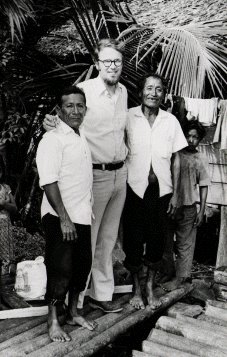
After three years living in Chile, South America, as a Peace Corps volunteer from 1966 to 1969, Dale A. Olsen, Ph.D and his wife Diane first experienced a tropical rainforest--the Amazon--on their slow trip back to the United States
After three years living in Chile, South America, as a Peace Corps volunteer from 1966 to 1969, my wife Diane and I first experienced a tropical rainforest--the Amazon--on our slow trip back to the United States. I remember well the endlessness of the trees, the lushness of the vegetation, the darkness of the waters, and the red earth where roads were carved out of the rainforest green. Three years later I experienced a different type of rainforest--the Orinoco Delta--where the only "roads" were thousands of rivers of all widths and shapes. Everything else was almost the same as the Amazon, except the native people lived over some of the rivers in stilt houses rather than on land. These were the Warao of Venezuela, a people who still thrive in the Delta of the Orinoco River, but whose existence is in peril as oil prospectors, lumbermen, narcotics traffickers, and eco-tourists intrude into their fragile rainforest world.
This "Ethnomusicological Survey" is like an "excursion" through the musical and magical rainforest world of the Warao. It is a musical journey to learn about Warao musical beauty, because music for the Warao makes their world meaningful, safe, and complete. It is a musical journey to learn about Warao life and beliefs. "Ah, such beautiful music," says the jaguar in a Warao story. "Now I won't eat you," says the jaguar, "because you are a musician." Music soothes, heals, protects, and connects the mortal and cosmic pathways of the Warao.
Our "excursion" begins by focusing on several aspects of Warao secular music and musical instruments, such as the lullaby, the deerbone flute, the violin, and the drum. By using song texts and folk tales (which are like Warao history books), aspects of the Warao world view and beliefs are introduced. It continues by looking at music and shamanism among the Warao of Venezuela (look at this link of Latin American rain forest maps, and click on various countries to see the breadth of the forested areas in South America). One of the most important contexts for music within the South American rain forest cultures is shamanism. A shaman is an individual who communicates with the supernatural for purposes of maintaining order in both the mortal and immortal worlds. He (or less often, she) usually does this by singing, because song is a special form of communication between humans and their spiritual advisors, protectors, and adversaries. The most powerful tool of the Warao wisiratu shaman is a huge rattle called hebu mataro (seen in the above picture as played by a wisiratu shaman).
